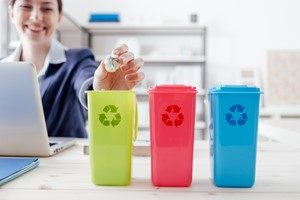 For those of us looking for small ways that we can contribute to an eco-friendly society, recycling is one of the best places to start. Since its inception in the 1970s, recycling technology has come a long way, making it easier than ever for consumers to recycle their household waste.
For those of us looking for small ways that we can contribute to an eco-friendly society, recycling is one of the best places to start. Since its inception in the 1970s, recycling technology has come a long way, making it easier than ever for consumers to recycle their household waste.
Although the excuses for not recycling are dwindling, there still can be a learning curve. Depending on where you live, there might be certain requirements you have to meet for your recycling to actually make it to the plant. And, in spite of the fact that we can now effectively recycle more materials than ever, there are still some items that you shouldn’t toss in the recycling bin.
If you’re new to recycling or just want to learn more about what you can and cannot recycle, read on.
Rules and regulations may vary
Let’s begin with a disclaimer: recycling isn’t the same everywhere. While many cities have free recycling and curbside pickup programs, some smaller towns and suburbs do not. In these instances, recycling is often a service provided by waste management companies in your area at a small added fee to your monthly garbage pickup bill.
What is single-sort recycling?
If you’re new to recycling, odds are you’re imagining having to sort out paper from plastic and metal and so on. However, due to single-sort recycling (also known as “no-sort” and “zero-sort” recycling) you don’t have to worry about putting different items in different bins.
With single-sort recycling, you can put everything in the same container and it will later be sorted automatically at a recycling facility using complex machinery.
What can I recycle?
Generally, the following items are now able to be recycled. However, you should follow the guidelines provided by your recycling company or municipal recycling facility.
-
Aluminum cans and foil.
2.7 million tons of aluminum is discarded each year, half of which gets processed at a recycling facility. The benefit of recycling aluminum is that it is 100% recyclable, so nothing is lost in the process. At the facility, aluminum cans, foil, and other products are shredded up and turned into small chips of aluminum that can be sent back for production and reuse.
-
Paper and cardboards.
Magazines, newspaper, cardboard, office paper, and juice cartons are just some of the paper goods that can be recycled. In the U.S., we recycling a large percentage of our paper goods due to the collection of newspapers. One item that people often toss in the recycling bin that isn’t able to be recycling is food containers that have food and grease seeped into them.
-
Glass items.
Most glass items are recyclable. However, crystal glass, heat-resistant glass, and ceramic items (like plates and mugs) are not able to be recycled at a facility and should either be repurposed or tossed out.
-
Electronics and batteries.
While you might not be able to toss most of these items in your recycling bin, there are several simple ways to recycle electronics and batteries. Calling your local appliance store, automotive retailers, and electronics stores like Best Buy often will take certain items for reuse and recycling.